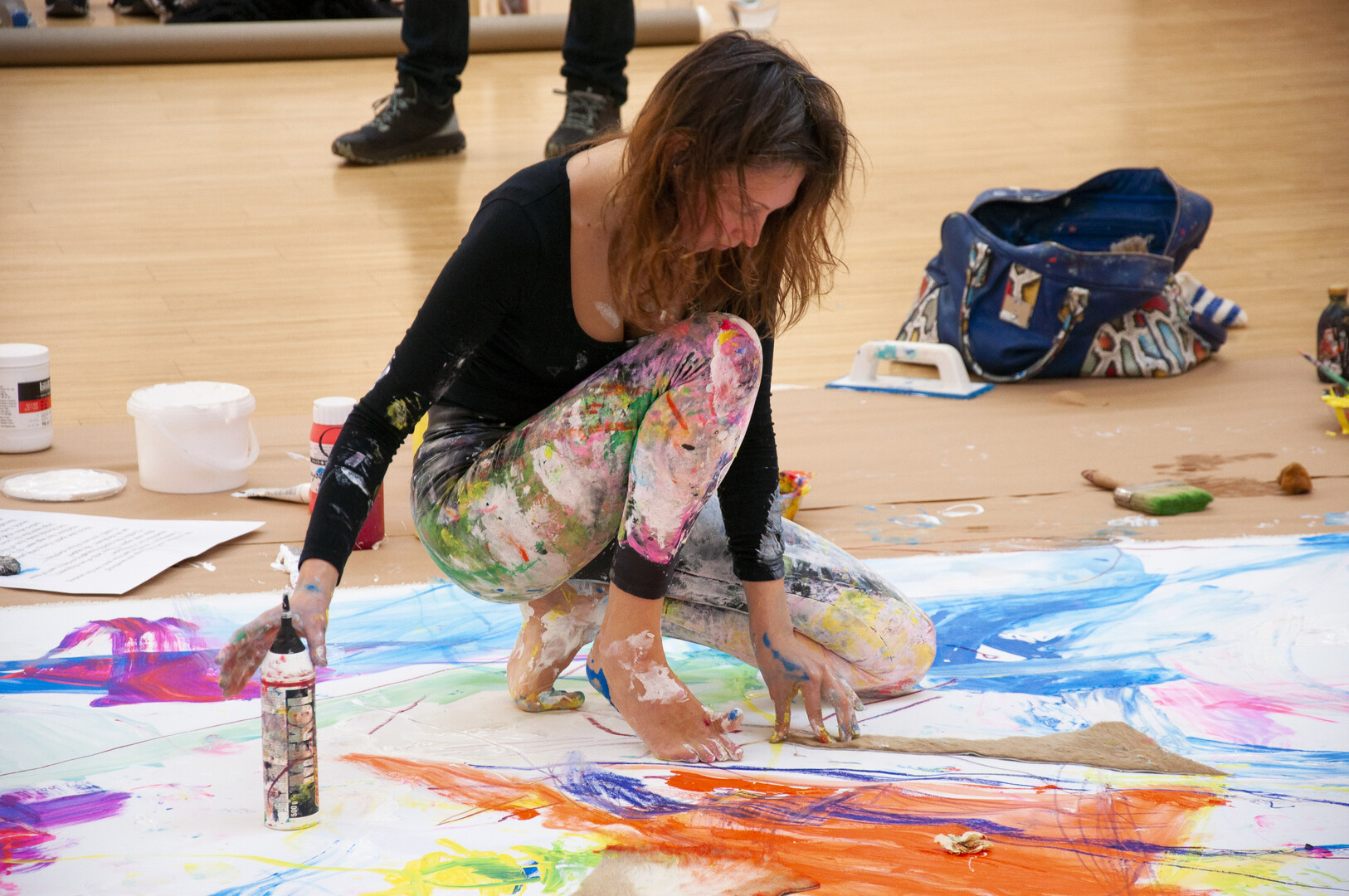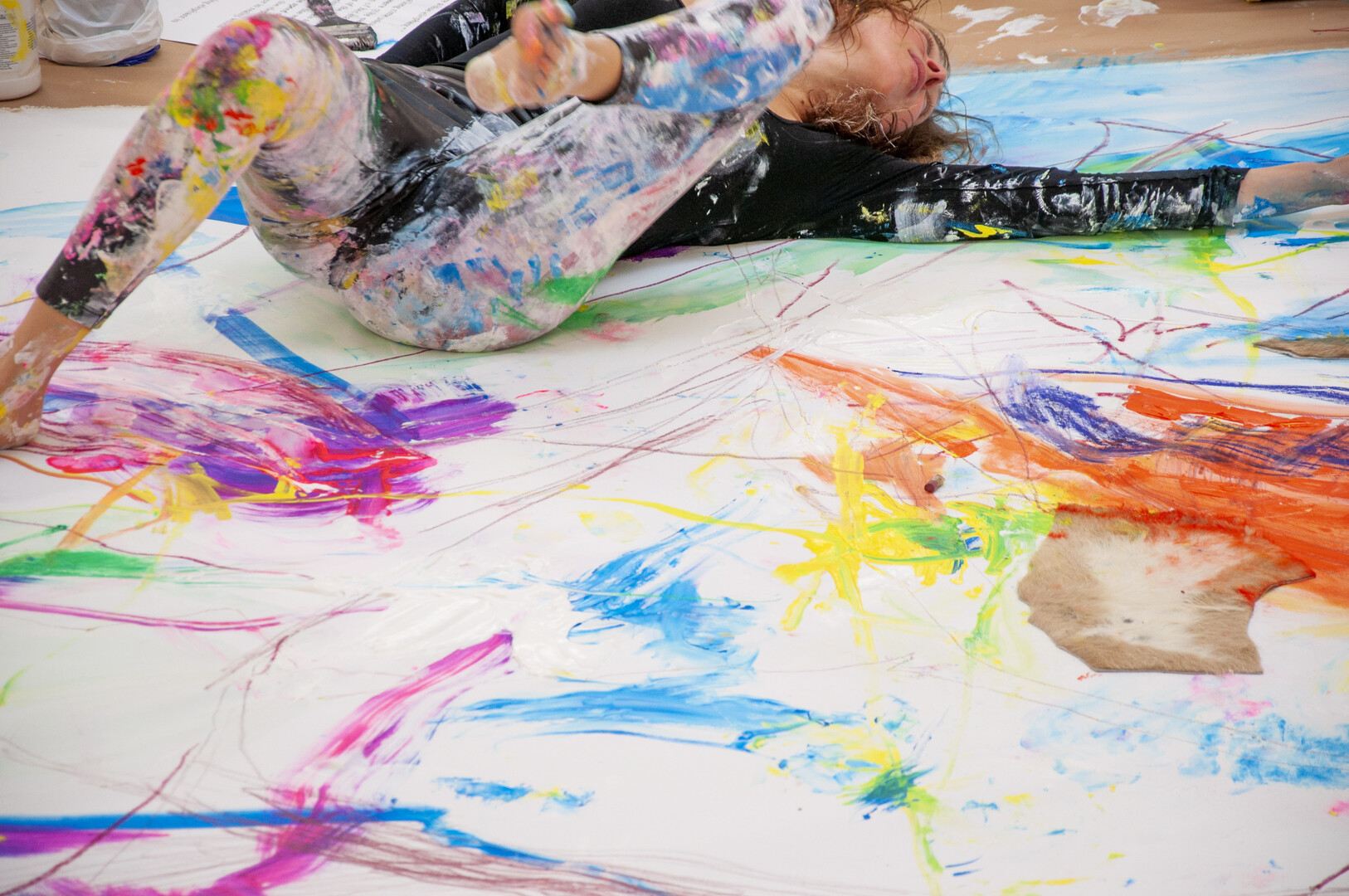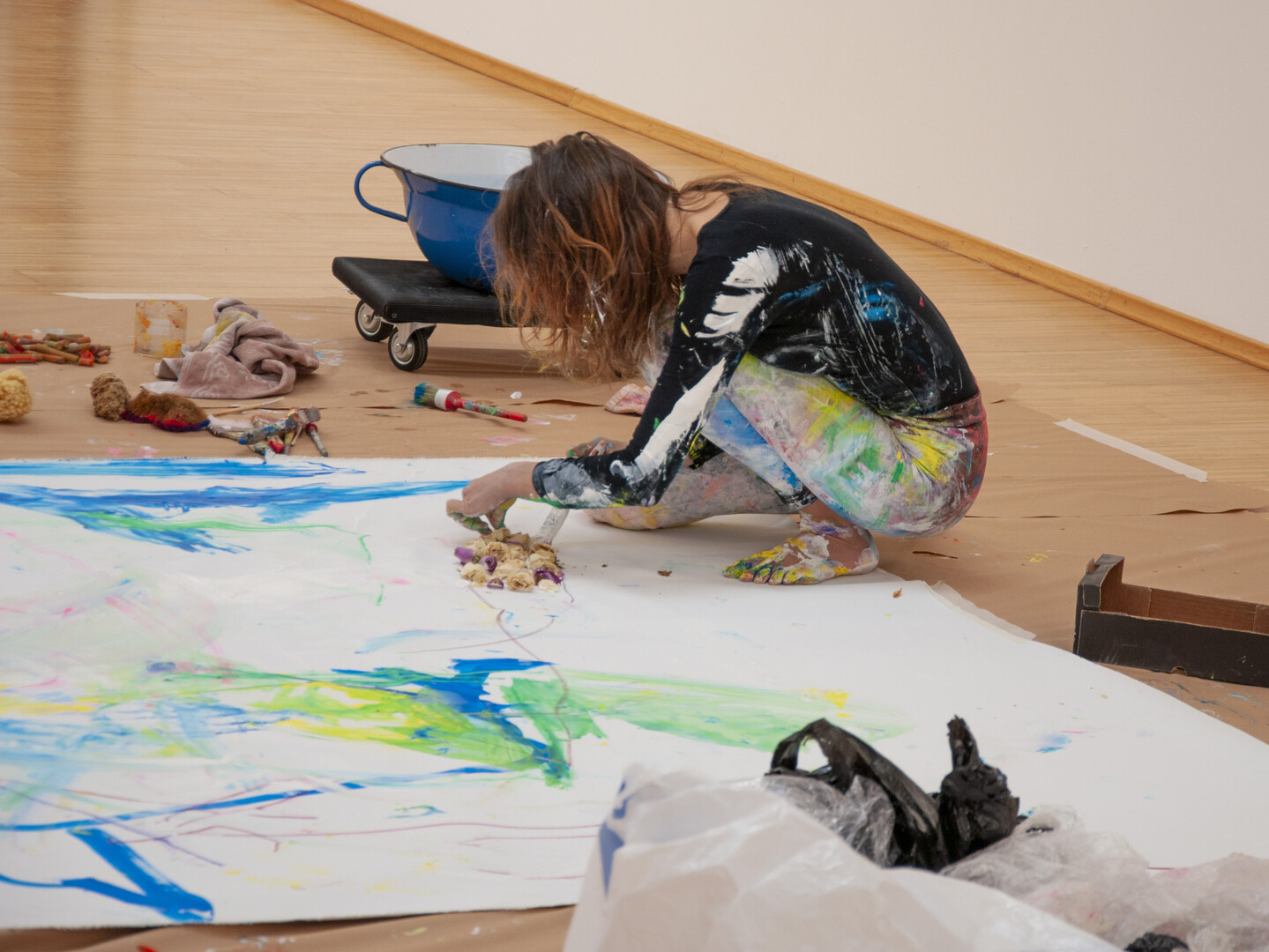Uroš Zavodnik & Nina Stopar
UROS ZAVODNIK
Film Director
Uros Zavodnik was born in Slovenia. He studied film art in Austria and finished his study in cooperation with the Academy for Theatre, Radio, Film and Television (AGRFT) in Ljubljana, Slovenia, with PhD out of film directing and the short feature film The Trial. He is also a member of the Actor Studio in Ljubljana, where he studies the acting technique of Lee Strasberg under the guidance of Janez Vajevec, a disciple of Lee Strasberg himself. He is a freelance film director, writer, producer, and actor.
Your project has entered in our festival. What is your project about?
'Nina Stopar - An Artist in Movement' is a documentary about the unique artist, who makes her canvas through diverse movement styles of her body and poetic expression, which it comes out of her subconscious, it reflects in colours and unique lines what is captured in the documentary through unique camera movement, light and editing style, i.e. montage.
What are your ambitions with your project?
The documentary shows the world the unique reflection of the inner emotions of an artist, how it could be reflected on the white empty canvas, to show the other artists how important is to reflect itself in a unique art style.
Tell us something about your shooting? What pleasantly surprised you?
The shooting captured the artist's moments of total 'absence' from life here and now, she entered her inner world and expressed her emotions on the canvas. This unique 'absence', to be in a specific artistic movement surprised me as a film director by making this documentary.
For what group of spectators is your film targeted?
The documentary is mentioned to be shown for all kinds of spectators, also the artists.
Why should distributors buy your film?
The documentary deals with the unique process of an artist whose expressions on the canvas are connected with her specific way, how she expresses herself in a movement and thinking.
How would you specify your work? What characterizes your film?
The documentary is a visual expression of an artist, she express herself in front of the spectator, so he can follow her thoughts, as she speaks, yet, much more is seen in lines and colours which she uses for making an image of herself, here and now, in front of the camera, of spectator.
Why did you decided to become a filmmaker?
It is my passion from childhood, as a filmmaker, director, writer, and actor, I was also a musician and I expressed myself through painting and photography, I can combine all that in a unique style and narration of my movies.
Who is your role model?
I'm a member of the actor studio in Ljubljana, where I was taught about method acting by Janez Vajevec, a despite of Lee Strasberg from the actor studio in NY. That's why expression of emotions is so important in my films, also the one, which I made with the artist Nina Stopar.
Which movies are your favorites? Why?
The SciFi movies (Blade Runner etc.) or the one with the specific author expression, visually and narratively, as it is 'Blow up' from Michelangelo Antonioni.
Where do you look for inspiration for your films?
By the big authors of the cinema history.
Which topics interest you the most?
Good-unique stories, which could be shown visually. Artist could be very unique, that's why I made a movie with Nina Stopar.
What do you consider your greatest achievement in your career?
Till now, my short movie 'Der Prozess' (The Trial), which I made as a part of my dissertation about film directing, also the movie about the artist, great painter Jože Ciuha, who succeeded in Paris, which I made as a documentary for the Slovenian national television, because in a process of making a film we talked a lot also about the life, how you could be free in life to be artistic productive, to be able to express yourself through the art, also SciFi movie 'Bergmandlc', Austrian-Slovenian production etc.
What do you consider most important about filming?
To find your unique style of visual and narrative expression, filmmaking is about telling the stories through the images and sound.
Which film technique of shooting do you consider the best?
Having a great film crew, so you can direct and focus on a film, which you already have in your head before you enter the film set, is the most fantastic process you can go through by filmmaking. So high-budget production, whatsoever 'film technique' should always support your movie in the best possible way.
How would you rate/What is your opinion about current filmmaking?
In Slovenia, it is hard to get financial support for your films, so the 'exit' is to try to make your movie as a coproduction or by yourself. Yet, if you are living from filmmaking, you should find the financial support to make your film in the best possible way. The film technique is much more affordable nowadays, yet you should remember why you are making the move, the story is always the most important.
What can disappoint you in a movie?
If the story is weak or the technique is more important as the story.
Who supports you in your film career?
Essential question: I need some 'patron', my parents did enough for me.
What are the reactions to your film? (opinion of spectators, film critics, friends and family)
A lot of people's spectators said I make unique films.
Have you already visited any of the prestigious film festivals?
Still, I'd like to visit them with an appropriate movie.
What are your future plans in filmmaking carriere?
The goal is to make a movie to participate in the big film festivals to win Palm d'Or, Golden Bär, Golden Lion or foreign-language Oscar,..
Learn more at
IMDb: https://www.imdb.com/name/nm3691186/
BSF: https://bsf.si/sl/ime/uros-zavodnik/

NINA STOPAR
An artist
Nina Stopar is a Slovenian artist, born in 1982. She studied Philosophy and the Slovenian language. She was a teacher for almost ten years. However, she has been interested in the field of art, and in 2016 she got an MA in Aesthetics. Here she studied contemporary art and claimed that nowadays, more than ever before, the artist himself has to become an artwork. She then dedicated her life more professionally to art, completing the MA of Painting at the Academy of Fine Art and Design in Ljubljana in 2021.
As a teacher of 5Rhythms, she believes that movement is the gateway to creativity, abstraction, and the artistic self. Nina explores abstraction as the dance of intuition of body in motion.
Your project has entered our festival. What is your project about?
I am thrilled that the short movie Nina Stopar: Artist in Movement will be presented at your festival. It is a very intimate exposure of my creative process. It is a movie about my body, feelings, and intimate relation to creation and the painting.
So the news, I got a few days later that my film will not be represented at the festival was quite shocking!
What are your ambitions with your project?
I wish to present the move to as many people as possible, whether at film festivals like yours or galleries and museums. I believe in the subversive elements of my art practice, so people need to know and hear about it. Creating an omnibus of various short movies would be a perfect project for an exhibition.

Tell us something about your shooting? What pleasantly surprised you?
The movie was part of my first solo exhibition in Slovenia. It was party-shooted in the gallery and party in my home village, in my artist studio, as a documentary of my practice because we wanted to draw my paintings near the audience.
On the other hand, I had already recorded a movie before (my first movie was recorded in Gymnasia during the second lockdown in 2020), as I know my painting process is an essential part of my art.
The shooting went well, but I would never guess that collaboration with an art director could be so chaotic. I am happy we made a good movie at the end.
For what group of spectators is your film targeted?
For anyone interested in the artist's creative process. And for those who want to relate to the emotional landscape of their inner world, for those afraid to be seen as vulnerable and authentic, what I guess is the majority of this planet, for those following consumer models of who we are, how we should be and how we should appear in reality and how we should express our feeling as we all would be already autistic. We have lost the natural gift of connecting and expressing our hearts. Even the most intimate space of ourselves is controlled or determined by the right way to respond, feel, or look.
Why should distributors buy your film?
For sifting the perspective and to deepen the view on creative action that dances on the edge, where consciousness sub-consciousness dissolves into the present moment of here and now.
How would you specify your work? What characterizes your film?
My short movie is different from as it was made to back up my practice, mostly, my abstract images and filmmaking or acting have not been my medium.
The movie is a short documentary about my creative process, what I do, and how I live.
Who is your role model?
I have always been impressed by artists, mainly painters, and how they relate and metaphorically express their inner reality of the outside world and how ridiculous they can be. I am also really impressed by many film directors, mainly the one that works from and with the realm of sub-consciousness, time, and traum in a poetic way such as David Lunch, Andrej Tarckovsky, Alehandro Jodorowsky, Jim Jarmush, and Von Trier with for example.
Where do you look for inspiration for your films?
Life and my inner landscape of who I am are the most significant places to explore and work with.
Which topics interest you the most?
Perspectives on Reality like solipsism, duality, nonduality, timelessness, time, synchronicity, multiplications, and exploration of oneself.
What do you consider your greatest achievement in your career?
I started living as a professional artist two years ago when I finished my master of painting in Ljubljana at the Fine Art Academy in Slovenia. Following myself, becoming a self-employed artist, and creating art that is not conventional in the post-pandemic time and time of an economic crisis, after working in secondary school as a languane teacher for almost 10 years, is a CHANGE I am proud of.
What do you consider most important about filming?
How the story is told, and how all the pieces come together. For this, a good filmmaker must use not just all the colors he has but also combine them with all the styles he knows and even add something he picks from the ground toward the shooting studio.
Which film technique of shooting do you consider the best?
I do not know anything about film techniques. But I do know what I like when I see a movie.
What can disappoint you in a movie?
If after 5 minutes I already know the end or if at the end, it leaves me on the surface.
What are the reactions to your film? (opinion of spectators, film critics, friends, and family)
Few said I am brave, but many people do not understand my abstraction. Locals from the village where I come from and where I have lived for the last 3 years said I am too advanced for them to understand my art. I value the opportunity to share and discuss my ideas.

Have you already visited any of the prestigious film festivals?
Ferfilm festival in Farisej in Kosovo this spring.
Learn more:
https://www.ninastopar.art/
